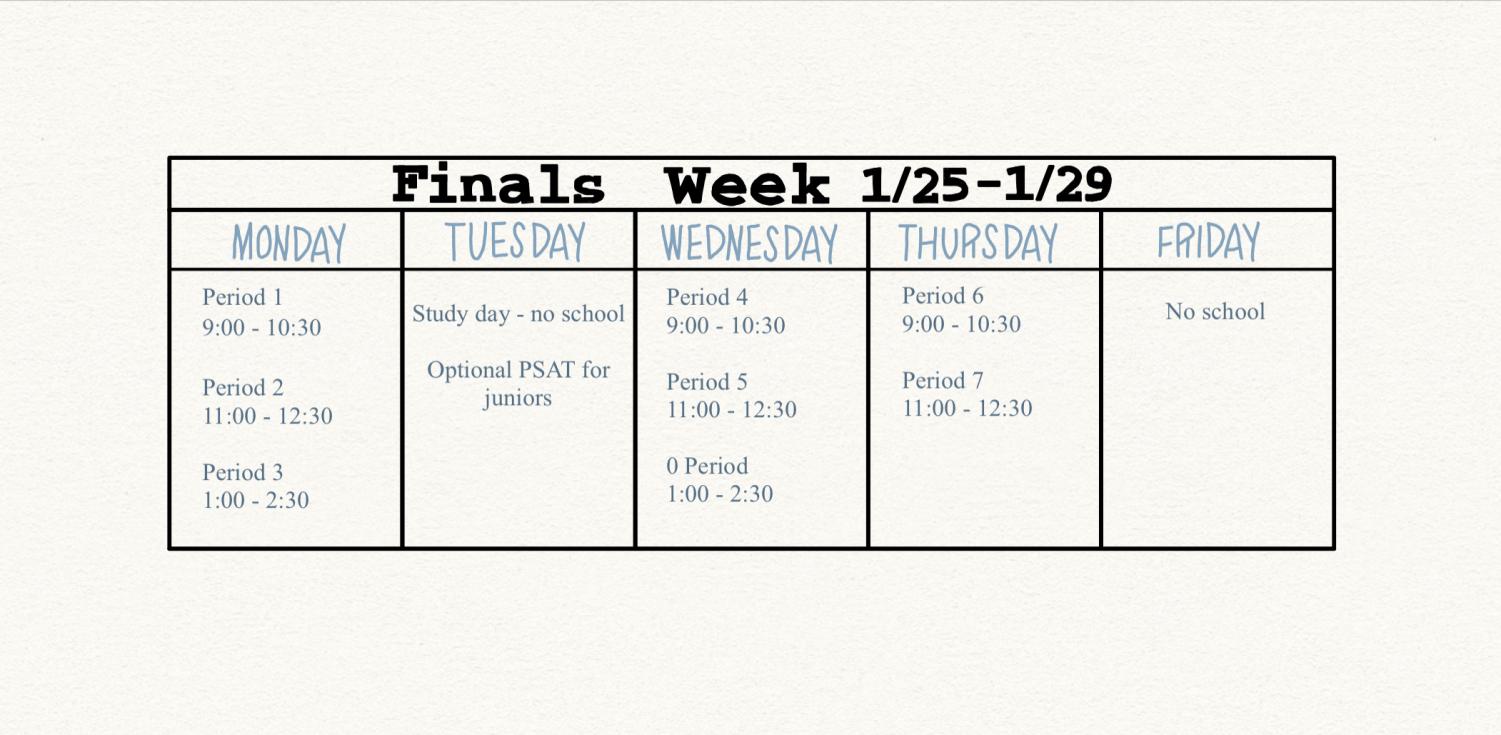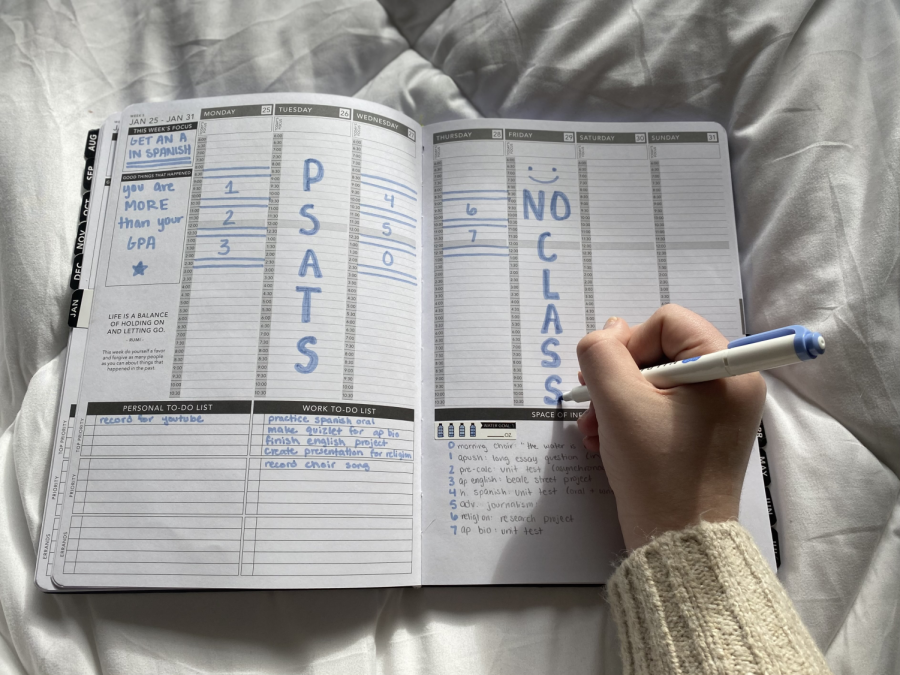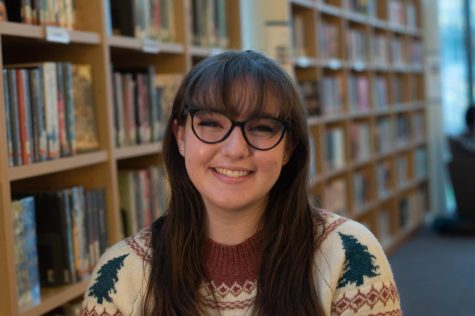“Finals” Week: How Students and Teachers Are Feeling
“The overall decision to take away sort of the standard stress that is accompanying finals week was, I think, a smart decision,” said Mr. Matthew Shedlock, in regard to how the first semester is being wrapped up this year.
January 20, 2021
Normally, the end of the semester is a time of chaos and cramming: students quizzing each other with flashcards and study guides during breaks, friends eating snacks and discussing how their previous final exam went, and long hours of trying not to fall asleep while scribbling down answers to multiple-choice questions.
But this year, things are looking different. To wrap up the end of the semester, a new plan has been put in place that accommodates digital learning – equipped with a new schedule and flexibility for each class.
“Our finals week is going to be somewhat non-traditional and traditional,” Vice Principal of Academics Ms. Kathleen Coughran said. “It’s a mix.”
Throughout the week, classes are expected to meet during their scheduled final exam period, but teachers have a variety of options on how they can use this time. Some of the different options include a traditional exam, an in-class discussion, an in-class essay, an asynchronous test, a unit test, and anything else that acts as a demonstration of students’ knowledge.
“What we tried to do was put the options of what to do with classes back in the hands of [each] department, and for them to kind of figure out what was best for them,” Ms. Coughran said.
To create the plan for the end of the semester, Ms. Coughran said that she worked with Vice Principal of Student Life Mr. Brian Devine, and they took their ideas to the Academic Council, which consists of chairs representing all nine school departments. After that, the Academic Council met with Ms. Coughran and Interim Principal Ms. Alanna O’Brien monthly, starting in November, to discuss the plan for finals.

“We even aren’t really even calling it finals week [this year], we’re calling it a special schedule for the end of the semester because we recognize that finals are tricky to be given in this format,” Ms. Coughran said. “It’s been a pretty non-traditional school year so far, and so we are trying to match that with how we’re going to run the final exams.”
Nonetheless, junior Soren Hoxsie said that the schedule still “feels like the same thing, but with online school,” despite the adjustments.
“I know everybody is stressed a little bit or a lot about online school,” Hoxsie said, “and that’s adding more stress to the table.”
Freshman Flora Peruzzo agreed, and said that she is “very worried” about the week. “It does add a lot of stress on top of what’s going on in the world, with coronavirus and stuff.”
Math department co-chair and math teacher Mr. Larry Swanson also acknowledged that “all 800 people in our community, whether we say it out loud or not, are struggling in one way or another.” However, “I think everybody needs a chance to wrap up,” he said.
Due to digital learning this year, Mr. Swanson has changed the format of his testing, and said that he plans on continuing to use this format when La Salle returns to in-person learning.
In his classes, students take tests asynchronously, but after their tests, Mr. Swanson doesn’t correct them right away. Instead, their “math families” – groups of four to five students – check each other’s work, and after changes are made, Mr. Swanson corrects that version and inputs a grade.
“I think that the idea of working together to fix your mistakes is a … lovely concept,” Mr. Swanson said. “[And] I still look at the kids’ tests, I can kind of tell you who’s good and who gets it and who doesn’t get it, so I’m getting that information.”
Mr. Swanson said he has seen “less stress among my students … when there’s just not the same deadline kind of talk.”
Mr. Swanson’s students took a unit test a few weeks ago, so during the week that the administrative team has allotted for wrapping up the semester, he has different plans. His AP students will have a test wrap-up, and his Honors Algebra 2 students will get started on a project for the second semester.
“You know how you get so tired of just thinking about everything all the time?” Mr. Swanson said. “The fact that we’re all kind of stepping back on the stress of finals… takes one thing off of our [minds].”
English teacher Mr. Matthew Shedlock has given his students essays, which are to be completed by the day their classes are intending to meet. Mr. Shedlock plans on using the scheduled bell time during the week to give students a chance to finish their final drafts, proofread their work, and turn everything in.
He also gave his classes a semester reading project, which needs to be completed that same week.
Mr. Shedlock said that this semester, the English department decided not to assign students vocabulary tests or short writing responses that are often a part of finals week.
“It’s more of a product of how they’ve done on a couple of larger assignments, like an essay or reading project,” Mr. Shedlock said. “From what I can tell, there’s probably a little less stress on the standard finals week that we normally would experience at La Salle.”
For physics teacher Ms. Margaret Ehrich, she has been focusing on project-based learning this semester, because her focus with digital learning has been to “give students something to do … [and] to make things as hands-on as possible.”
Because of this, Ms. Ehrich said that her freshmen classes have not had any exams this year – only a few quizzes – but for her AP Physics class, she had to take a more exam-based approach because this class leads up to the AP exam in May. “I think it’s important to have assessments because they do take a pulse on where your students are at,” she said.
For each test, Ms. Ehrich gives her students questions from previous AP exams. “I say, ‘OK, take it home, do it, take your time,’ and they also have to submit either an audio or a video recording of themselves going through how they solve the problems.”
This is to prevent cheating – an idea that Ms. Ehrich said she got from science and computer programming teacher Mr. Kyle Voge. With the recordings, “it’s easy to tell if you’re disingenuine,” Ms. Ehrich said.
Other teachers, like Spanish teachers Ms. Karen Kessler and Ms. Amy Gantt, have adapted a double-device system for tests so they can see their students and the iPads that they’re working on.
Mr. Shedlock is not concerned about the aspect of cheating, because “teachers have enough tools to construct a final exam that can account for sharing answers.”
However, freshman Queen-Heaven Womujuni said that she “100 percent” believes that students will still cheat – if teachers assign tests during this week – due to them being digital, “because they want an easier way out of it.”
Sophomore Gabbi Tassinari similarly said that cheating would be likely if tests were to be assigned. “It’s kind of inevitable that like, ‘oh, high school students [are] learning at home and they’re not going to use their resources,” Tassinari said. “It’s kind of hard to have academic integrity [because of] the temptation of it.”
Muraki agreed with how easy cheating seems with the digital format. “I’d like to give the benefit of the doubt to people, but I’m sure someone’s going to try,” he said.
Nonetheless, Mr. Swanson’s plan to combat cheating is “to tell my students that I love them,” he said.
“I’m serious,” said Mr. Swanson, who handles cheating privately with students when he recognizes it. “And every year I have a kid or two who cheats … You can’t hide it at all when your daily work is mediocre and you automatically miraculously do really well on a test.”
While the administration doesn’t have a specific plan in place to prevent cheating, “I think teachers have figured out ways to get around some of those cheating issues,” Ms. Coughran said. “[And] our hope is that our students are approaching the final exams as a way to demonstrate their knowledge and not to take the easy way out.”
Last year, second semester finals were canceled because of the sudden shift to digital learning. “I was relieved,” Tassinari said about last year’s cancellation. “I had been struggling last year keeping up with online school, just because I felt like all of the assignments were piling on top of each other and it was starting to get overwhelming at that point.”
Senior Kai Muraki also said that he felt relieved, but that he had been worried at the same time.
“I really wanted to see where I stood with my academics at the end of the day, but without that, it was kind of like ‘eh,’” he said. “It kind of left me questioning whether I was still doing fine or not.”
Yet for this year, while finals are not canceled entirely, they are flexible to work with digital learning. “We feel that our teachers are much more well-versed in digital learning this semester,” Ms. Coughran said. “I feel like they’re doing a great job.”





